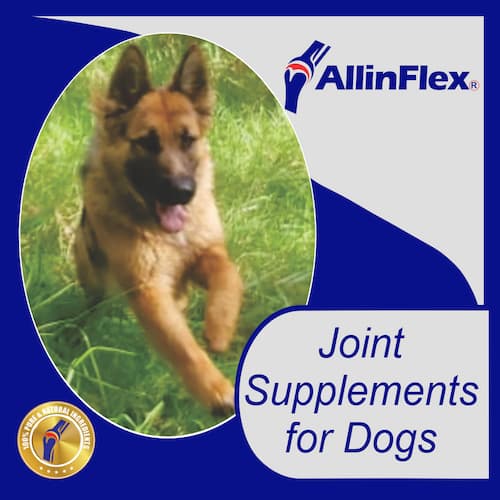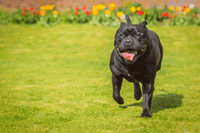Introduction to German Shepherd Joint Maintenance: Effective Care for Your Active Companion
Saskia OstermeierGerman Shepherds are renowned for their versatility, serving as loyal family pets, dependable working dogs, and effective service animals.
Known for their strength, intelligence, and obedience, they play critical roles in various settings, from family homes to law enforcement. Given their active nature, maintaining robust canine joint health is paramount for a German Sheppard to ensuring they can fulfil their roles effectively and enjoy long lasting joint mobility.
Joint health is especially crucial for German Shepherds, as it directly impacts their ability to perform physically demanding tasks.
Whether dogs are engaging in regular family play, performing in agility dog sports, or working in search and rescue, their joints bear a significant load. Effective joint maintenance can help prevent discomfort that might impede their activity and quality of life.
In this blog post, we'll delve into the essentials of joint care tailored specifically for German Shepherds. We will explore how proper nutrition, appropriate exercise, and the right supplements can play a crucial role in sustaining their mobility and ensuring they continue to thrive in their active roles.
The Basics of Joint Health in German Shepherds.
Understanding the structure and functionality of joints is essential for any German Shepherd owner. Given their active duties and lifestyle, German Shepherds rely heavily on robust joint health to perform at their best.
Joint Structure and Function of German Sheppards.
A joint is composed of bones that are connected by cartilage, ligaments, and synovial fluid. This arrangement allows for smooth movement and flexibility, which is crucial for activities like running, jumping, and manoeuvring. For German Shepherds, who often engage in dynamic and physically demanding tasks, maintaining the integrity of these joint components is key to their mobility.
Importance of Healthy Joints in a German Sheppard.
Healthy joints are vital for German Shepherds not only to fulfil their roles as working dogs or active family pets but also to maintain their overall well-being. Proper joint function allows them to participate in daily activities with ease and comfort. Maintaining this aspect of their health is crucial to prevent the gradual wear that can come from their vigorous routines.
Signs of Decreased Mobility in German Shepherds.
Spotting early signs of decreased mobility can help address potential joint concerns before they develop into more significant issues. For German Shepherds, changes in mobility may be subtle at first but can become more apparent over time.
Behavioural Changes to Watch for in your German Sheppard.
- Hesitation to climb stairs or jump into cars, which were previously effortless.
- Showing signs of difficulty when rising from a resting position or after lying down for extended periods.
- A noticeable reduction in enthusiasm for activities that involve a lot of movement such as running or playing fetch.
Early Monitoring.
Keeping an eye on these behavioral changes is crucial. Early monitoring allows for timely adjustments in care and management, helping maintain your German Shepherd's joint health and activity levels. This proactive approach is fundamental in ensuring that your dog continues to live a comfortable and active life.
Nutritional Support for Healthy Joints.
Nutrition plays a pivotal role in maintaining the joint health of German Shepherds. A diet rich in specific nutrients can support the integrity and functionality of joints, crucial for dogs that are expected to perform a range of physical activities.
Essential Nutrients for Joint Health in German Sheppards.
- Omega-3 Fatty Acids: These are vital for reducing inflammation, which can help manage discomfort associated with joint wear. Sources include fish oils and flaxseed oils, which can be easily added to a German Shepherd's diet.
- Glucosamine and Chondroitin: Often found in the cartilage, these supplements can support joint cushioning, which is beneficial for dogs that perform high-impact activities. They can help maintain cartilage health and joint fluidity.
- Vitamins C and E: These antioxidants play a role in protecting the joints from oxidative stress and in the production of collagen, a key component of cartilage.
Incorporating Healthy Foods in a Dog's Diet.
Integrating foods that are rich in these nutrients into your German Shepherd's diet can be a practical way to support their joint health. Foods such as blueberries, sweet potatoes, and green vegetables provide vitamins and antioxidants, while fish like salmon can be a good source of omega-3 fatty acids.
The Role of Supplements in Supporting Canine Joint Health.
While a balanced diet is foundational, supplements can provide additional support for the joints of German Shepherds, particularly those that are highly active or beginning to show signs of joint stress.
Choosing the Right Supplements for your German Sheppard.
- When selecting supplements, look for those that contain a combination of glucosamine, chondroitin, and MSM (methylsulfonylmethane). These ingredients are known for their ability to support joint health and enhance mobility.
- It's also beneficial to include supplements that contain green-lipped mussel or hyaluronic acid, which are known for their soothing properties and support of joint lubrication.
Integrating Supplements into Daily Dog Care.
- Supplements can be administered in various forms such as powders or capsules. Choosing a form that suits your dog's preference can ensure consistent intake.
- Regular use of these supplements, in conjunction with a well-rounded diet, can significantly contribute to maintaining your German Shepherd's joint health and mobility.







